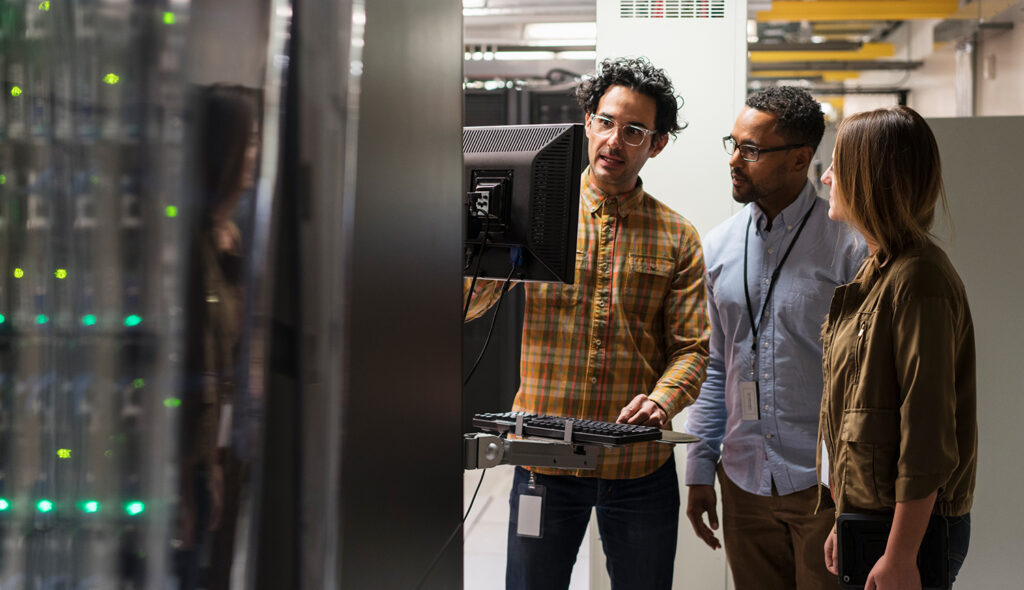Online
Not Required
Credit Hours
Courses
Pathways to a Degree
Connect with an Enrollment Advisor
Connect With UsMS in Computer Science Program Overview
The Tufts online Master of Science in Computer Science (MSCS) program is designed for futuristic thinkers with prior programming experience. It prepares students to develop innovative solutions for digital challenges, offering transformative learning experiences and access to cutting-edge course content.

Computer Science Career Outlook
The computer science field is rapidly growing, and organizations across industries are eagerly pursuing new talent. Employment in this sector is expected to increase 23 percent by 2032,* and the average salary of U.S. computer science master’s degree holders is $112,000.**
The Tufts master’s in computer science online program will equip you with the skills and credentials needed to pursue new job opportunities, advance within your current organization, and increase your earning potential. From building applications to developing large-scale software systems, you’ll participate in transformative learning experiences that challenge you to think critically and develop creative solutions with real-world applications.
*U.S. Bureau of Labor Statistics, 2024
**Payscale, September 2024
Explore high-demand jobs you can pursue with an online computer science master’s degree and the average salary you could earn:
| Job title | Average salary |
|---|---|
| Vice president (VP), information technology | $164,070 |
| Director of engineering | $159,910 |
| Senior product manager | $140,046 |
| Machine learning engineer | $127,254 |
| Principal software engineer | $127,254 |
| Senior software engineer | $127,254 |
| Senior systems engineer | $127,254 |
| Software developer | $127,254 |
| Software development manager | $127,254 |
| Information security officer | $112,008 |
| Data scientist | $103,501 |
| Solutions architect | $102,232 |
| Test/quality assurance engineer | $99,611 |
| Source: Lightcast, 2023 |
Why Choose Tufts University for Your Master’s in Computer Science Online?
A world-class research institution, Tufts develops leaders who advocate for public good. As a MS in Computer Science online student in the School of Engineering, you’ll join a collaborative community and strengthen a forward-thinking, innovative mindset through hands-on experiences and industry partnerships.
Interested in computer science but don’t have prior experience?
Explore the Pathway to MS in Computer Science Program Complete the Program Fit AssessmentMS in Computer Science Courses and Curriculum
The Tufts online Master’s in Computer Science program offers a cutting-edge curriculum that spans disciplines and equips students with the core principles, fundamental concepts, and key theories needed to successfully generate computer science solutions in the field. Rigorous coursework will introduce you to challenges and research problems involving the creation of new types of computer software and the development of advanced implementation skills. You’ll enhance your knowledge and confidence in various areas of computer science, including algorithms, artificial intelligence, machine learning, networks and protocols, software engineering, computer security, and database systems. After completing the program, you’ll be prepared to develop programs in various languages, analyze algorithm complexity, communicate effectively, provide mathematical proofs for algorithms, identify computability classes of languages, and discuss programming language semantics.
Core Requirements
3 Credits
Analyze the fundamental issues in operating system design, including concurrent processes such as synchronizations, sharing, deadlock, and scheduling. Examine the relevant hardware properties of uniprocessor and multiprocessor computer systems.
Or
3 Credits
Delve into the fundamentals of cybersecurity, including attacking and defending networks, searching for vulnerabilities, cryptography, reverse engineering, web security, static and dynamic analysis, malware, and forensics. Hands-on labs and projects are included.
3 Credits
Examine core principles and ideas that enable the development of large-scale software systems, with a focus on programming. Explore abstraction, modularity, design patterns, specification, testing, verification, and debugging.
4 Credits
In this introduction to the study of algorithms, explore strategies that include divide-and-conquer, greedy methods, and dynamic programming. Delve into graph algorithms, sorting, searching, integer arithmetic, hashing, and NP-complete problems.
3 Credits
Study models of computation that include Turing machines, pushdown automata, and finite automata. Learn grammars and formal languages, such as context-free and regular set. Better understand important problems, including language equivalence theorems and the halting problem.
Four to Six Electives
3 Credits
Analyze the fundamental issues in operating system design, including concurrent processes such as synchronizations, sharing, deadlock, and scheduling. Examine the relevant hardware properties of uniprocessor and multiprocessor computer systems.
Or
3 Credits
Explore the fundamental concepts of database management systems, including data models, SQL query language, implementation techniques, the management of unstructured and semi-structured data, and scientific data collections.
3 Credits
Delve into the fundamentals of cybersecurity, including attacking and defending networks, searching for vulnerabilities, cryptography, reverse engineering, web security, static and dynamic analysis, malware, and forensics. Hands-on labs and projects are included.
3 Credits
This course introduces the latest techniques and infrastructures developed for big data, including parallel and distributed database systems, map-reduce infrastructures, scalable platforms for complex data types, stream processing systems, and cloud-based computing. The course content will be a blend of theory, algorithms, and practical work.
3 credits
This course will discuss the limits of current web technologies, the similarities and differences between web and software engineering, design, information and service architectures, content management, and testing disciplines. Frameworks such as Rails, Spring, and Symfony will be emphasized and used. Projects will involve search, cloud computing, location-based services, and mobile web development.
3 Credits
Learn the history, theory, and computational methods of artificial intelligence. Basic concepts include representation of knowledge and computational methods for reasoning. One or two application areas will be studied, to be selected from expert systems, robotics, computer vision, natural language understanding, and planning.
3 Credits
Investigate the methods that computers can use to learn from data or experience and make corresponding decisions. Topics explored include supervised and unsupervised learning, reinforcement learning, and knowledge extraction with applications to science, engineering, and medicine.
3 Credits
This course will focus on agents that must learn, plan, and act in complex, non-deterministic environments. We will cover the main theory and approaches of reinforcement learning (RL), along with common software libraries and packages used to implement and test RL algorithms. The course is a graduate seminar with assigned readings and discussions. The content of the course will be guided in part by the interests of the students. It will cover at least the first several chapters of the course textbook. Beyond that, we will move to more advanced and recent readings from the field (e.g., transfer learning and deep RL) with an aim towards focusing on the practical successes and challenges relating to reinforcement learning.

Capstone Project
6 Credits (3 per semester)
In this two-course, hands-on, culminating project for the program, students demonstrate what they’ve learned via project planning, design, implementation, testing, and presentation of their projects. Throughout their capstone project, students work closely with a faculty advisor for guidance and support. Master’s students have the flexibility to choose the depth and scope of their capstone project, which can range from a detailed report to a smaller-scale presentation. Unlike a Ph.D. thesis, a capstone project doesn’t necessarily require novel contributions but should be something the student hasn’t done before and should challenge their skills by involving the application of techniques in a new context. The capstone presentation is less formal than a Ph.D. defense and is often conducted via Zoom with only the advisor present.
In addition to these courses, students have the option to take Electrical Engineering 104 and Math 166 from the Data Science program, as well as other Tufts courses that are offered intermittently online. If one interests you and is available online, you can talk to your advisor about implementing it into your personal curriculum. Note: Courses must be numbered 100 or higher and contribute to a master’s in a technical field, and must be approved by the student’s advisor.
Elevate Your Computer Science Skills to the Real World With Your Capstone Project
Demonstrate the skills you develop by designing and implementing a capstone project that addresses a real-world challenge, like Steve Hong, who created Food Tusker, an innovative smart food management system aimed at minimizing household food waste. Learn more about Steve’s project and other impressive projects.
Explore Capstone ProjectsFeatured Computer Science Faculty





Frequently Asked Questions
Computer science jobs are expanding across industries as more organizations prioritize their technical needs. As a graduate of the Tufts master’s in computer science online program, you will have the tools to pursue the highest-earning computer science roles in areas such as software development, solutions architecture, cybersecurity, and data science, among others.
You can complete the master’s in computer science online program from Tufts in less than two years when you take two courses per semester. The part-time, 100 percent online program allows you the flexibility to complete our rigorous curriculum while maintaining balance in your personal and professional life. As a part-time student, you can expect to spend 10-20 hours per week on asynchronous coursework, synchronous class time, and group projects.
Yes. Computer science employment is expected to increase significantly, with over one million people hired in the next ten years. To meet this growing demand for experienced computer science professionals, you need to expand your expertise. Earning a master’s degree will help you develop in-demand computer science skills and gain credentials that can help you advance into a management role.
To apply to the Tufts online MS in Computer Science (MSCS) program, you should have prior programming experience. Our program is designed for thinkers who possess a foundational understanding of programming concepts. Whether you’ve worked professionally in the field or have pursued programming as a hobby, your prior experience will provide a solid foundation for success in our program. Students who successfully complete the Pathway to MS in Computer Science (post-baccalaureate certificate) will be eligible to enroll in the online MSCS program.
The application requirements for the Tufts online MSCS program include:
- Application fee
- Resume/CV
- Personal statement
- Transcripts
- Three letters of recommendation
- Official GRE scores (if applicable)
GRE scores not required for applicants who will have received a degree from an institution located in the U.S. or Canada at time of enrollment. - Official TOEFL, IELTS, or Duolingo test scores (if applicable)
- Portfolio (optional)
For application help, schedule a one-on-one walkthrough with an enrollment advisor.
The 2024-2025 tuition rate for School of Engineering graduate level courses is $1,765 per credit.* Please review tuition and financial aid resources available to online MSCS students.
*While most tuition rate changes are effective in the fall term each academic year, The Trustees of Tufts College reserve the right to change the tuition or to establish additional fees or charges for special features or services whenever such action is deemed advisable. We will provide the earliest possible notification of changes in tuition and other fees.
Yes, Tufts University offers a range of scholarships and financial aid options to support students in their academic pursuits. Reach out to our dedicated financial aid advisors to explore scholarship opportunities, grants, loans, and other forms of financial assistance.
As a student in the Tufts online MSCS program, you’ll have access to a comprehensive array of support services designed to enhance your learning experience and facilitate your academic success. These services include:
- Dedicated academic advisors
- Technical support resources
- Online tutoring
- Career counseling
- Networking opportunities
- Access to online library resources and research databases
Our goal is to provide you with the support you need to excel in your studies and achieve your professional goals.
No, the Tufts online MSCS program is 100 percent online, allowing you to complete your coursework from anywhere. Our flexible online format enables you to balance your studies with your personal and professional commitments while still benefiting from the same high-quality education and resources available to on-campus students.
To learn more about the Tufts online MS in Computer Science program, schedule a one-on-one walkthrough with an enrollment advisor or request more information. Tufts University offers a flexible, 100 percent online program designed to help you advance your career.
Tufts University Accreditation
Tufts University has been continually accredited by the New England Commission of Higher Education (NECHE), one of seven regional higher education accrediting bodies in the United States, since 1929. Tufts is evaluated by and achieves accreditation from NECHE once every ten years. The next comprehensive evaluation will take place in Spring 2033.